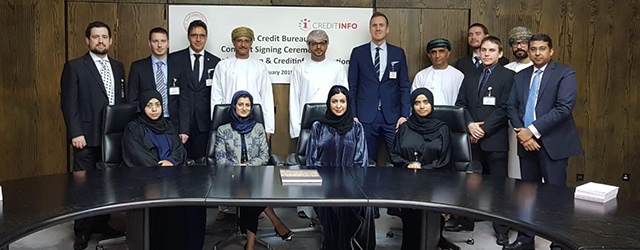Oman is tapping an Icelandic startup for a new bureau to speed credit applications.

From arid Oman to glacier-bound Iceland is a long way, but it’s the route the Gulf sultanate took this year seeking a means to spur investment and financial inclusion.
“After exploring many models … the Central Bank of Oman (CBO) decided to establish an independent national center for both credit and financial information covering the banking, telecoms, utilities and insurance sectos with full administrative and financial independence,” explains Aadil Saadi, who is spearheading the launch for the Central Bank. The CBO hired Icelandic firm Creditinfo to help launch and run a bureau to give lenders and credit-dispersing merchants more-reliable credit risk data. Launched earlier this year, it will be rolled out gradually over three years. Creditinfo operates in about three dozen countries, notably in Eastern Europe, Africa and the Middle East.
The new credit bureau follows similar efforts elsewhere in the GCC, including Saudi Arabia, the UAE and Kuwait. Credit bureaus are part of broader economic reforms being enacted to encourage foreign investors and domestic entrepreneurs, especially in non-oil sectors. A lack of reliable credit ratings is often blamed for slowing financial-sector growth.
“The GCC countries are all basically trying to up their games and modernize their economies,” says Ketaki Sharma, CEO of Algorithm Research, a UAE-based research and data analytics firm. The objective is to reduce dependence on shifting oil prices and the public sector. “Most of the GDP has been driven by public-sector spending,” Sharma says. “Now they want more private spending and investment.”
Oman lags the UAE and Saudi Arabia, which have set many GCC economic policy benchmarks, analysts say. The sultanate ranks 78th on the World Bank’s Ease of Doing Business index and a woeful 134th out of 190 nations in ease of obtaining credit. Earlier this year, Moody’s downgraded the sovereign credit rating to junk, following similar moves by Fitch and Standard & Poor’s. “Oman and Bahrain sometimes stick out as poorer cousins,” says Louis Lau, director of the Investments Group at Brandes Investment Partners.
Technologically, today’s manual credit-reporting system “is quite clunky” explains Gary Brown, head of commercial development for Creditinfo Gulf in Muscat. “It takes five days at least to get approval,” Brown says. “We want to reduce that to five minutes.”
After establishing the basic infrastructure, the CBO and Creditinfo plan to expand credit bureau membership beyond the 25 financial institutions currently in the manual system to include utilities, telecommunications firms, small and medium-sized businesses, and the Ministry of Commerce. More-standardized data and greater transparency should increase access to credit and reduce nonperforming loans, Sharma argues. “Basically, it will make the system more efficient and help improve GDP growth.”
Until recently, credit in the GCC was often “name lending,” as Lau put it, granted more on the borrower’s reputation than deep due diligence. This practice has come under question after some high-profile defaults. Creditinfo’s Coremetrix tool asks applicants a range of questions to develop a profile of who is likely to repay. Creditinfo says it works with local psychologists to ensure that questions are attuned to local culture.
The partners expect to gradually launch a series of value-added products, says Brown, such as scoring and modeling solutions, decisioning software, alternative data solutions and mobile lending platforms. “There are so many people who do not have bank accounts but have a mobile device,” Brown says.



